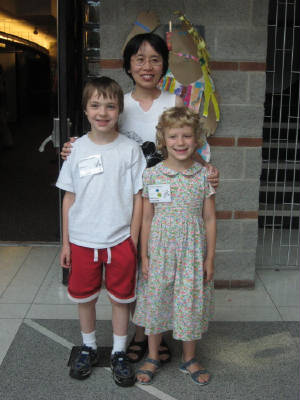|
Piano studio - Jeanette Wong |
|
|
Newsletters
This is a 3-column page. |
||||
|
Suzuki Piano – Newsletter Class of Jeanette Wong October, 2008 Dear parents, This newsletter is something new that I start as a communication tool to you all. News about concerts, SMM (Suzuki
Musique Montreal) and things that are related to our Suzuki program will be included. Summer Institute This past summer in the last week of July, 2008 two of my students, Francesca and James, had participated in the
Suzuki Summer Institute in Let’s read on Francesca’s reflection of her experience. The Institute is great! By Francesca Hellerman, age 7 (two-time
Institute participant) The Institute is great because you learn
a lot. My teacher said if you go to the Institute in the summer you advance more
quickly in the fall. At my small-group lesson I learned part of a song that another
child was working on because I heard him play it so many times. You go to different classes all day
long. There’s Dalcroze class which is movement with music. There’s group lesson where we do fun music games. The
first day of the Institute there’s a grown-up recital and the other days you go to recitals by children. You get to hear what songs other children are playing and that can give you a preview of where you will
be learning in the future. When you are older you get to play duets with another
child, which was really fun. There’s a big field and you eat lunch
on that field. You get to meet children from lots of different places who are
all studying Suzuki. There’s a little shop where you can get good music
accessories like music books and bags for your music stuff. You can stay and
do activities like soccer or art after the regular day if you want. CD Listening At Home Listening is considered the most important
part of the Suzuki method. Through listening, the children absorb unconsciously the language of music just as they absorb
the sounds of their mother tongue. While the child should listen to the CD
for a total of one hour a day, the parent should listen with the child. When you have listened a lot to the music, your confidence
in helping your child will definitely increase! Parent-Teacher Communication/ Good Note-taking Parents can feel free to ask me questions
at the lesson or send me an email. On the other hand, I want to be sure that parents take good notes at the lesson; it means
writing down the steps to practice at home and the specific assignments for the week. If they are not clear, please ask me
again at the end of each lesson. Home Practice Be Consistent Establish a habit of regular daily practice.
This regularity will not only improve the child’s skills, but will develop a discipline in the child that will carry
into other areas throughout his entire life. Practice Time Discuss frequently with the teacher. For
pre-school beginner, sitting frequently for five to ten-minute intervals is a way of initiating him into longer practice sessions
to follow. The amount of time needed should gradually increase. One-point Focus on Review The purpose of review can be meaningless
unless there is some kind of a goal in it. Instead of rushing through the pieces, setting wild tempos; concentrating on one
specific goal for the week, such as tome quality, dynamics, etc. will avoid the meaningless playing that so easily happen. Set Goals for Motivation Practice is much more interesting and motivating
when there are goals. Many can be simple ones such as preparing pieces for weekly mini-recitals at home for families and friends.
Taping pieces to send to grandparents, other relatives or friends as a present or surprise can be a delightful goal. Performing
at group lesson and concerts are also a good motivational goal. Praise and Self-esteem Here are some good tips on how to praise
your child during practice: 1. Describe what you see or hear. “I see your fingers are nicely
curved when you play this phrase.” “I hear beautiful happy tone
on the first two notes!” “You play Lightly Row with
a steady tempo.” 2. Describe what you feel. “I am so happy that we have
worked on all the exercises today!” “You have sat so quietly at
practice today, it’s a pleasure to work with you!” 3. Sum up the child’s praiseworthy
behavior with a word. “You have followed the step
of the practice and you have done it everyday this week. That’s what I called consistent!” “You have worked on the difficult
part for the whole week and at the end of the week you are able to put both hands together. You have shown such perseverance!”
Enter third column content here |
|
|||
|
Enter supporting content here |
||||
